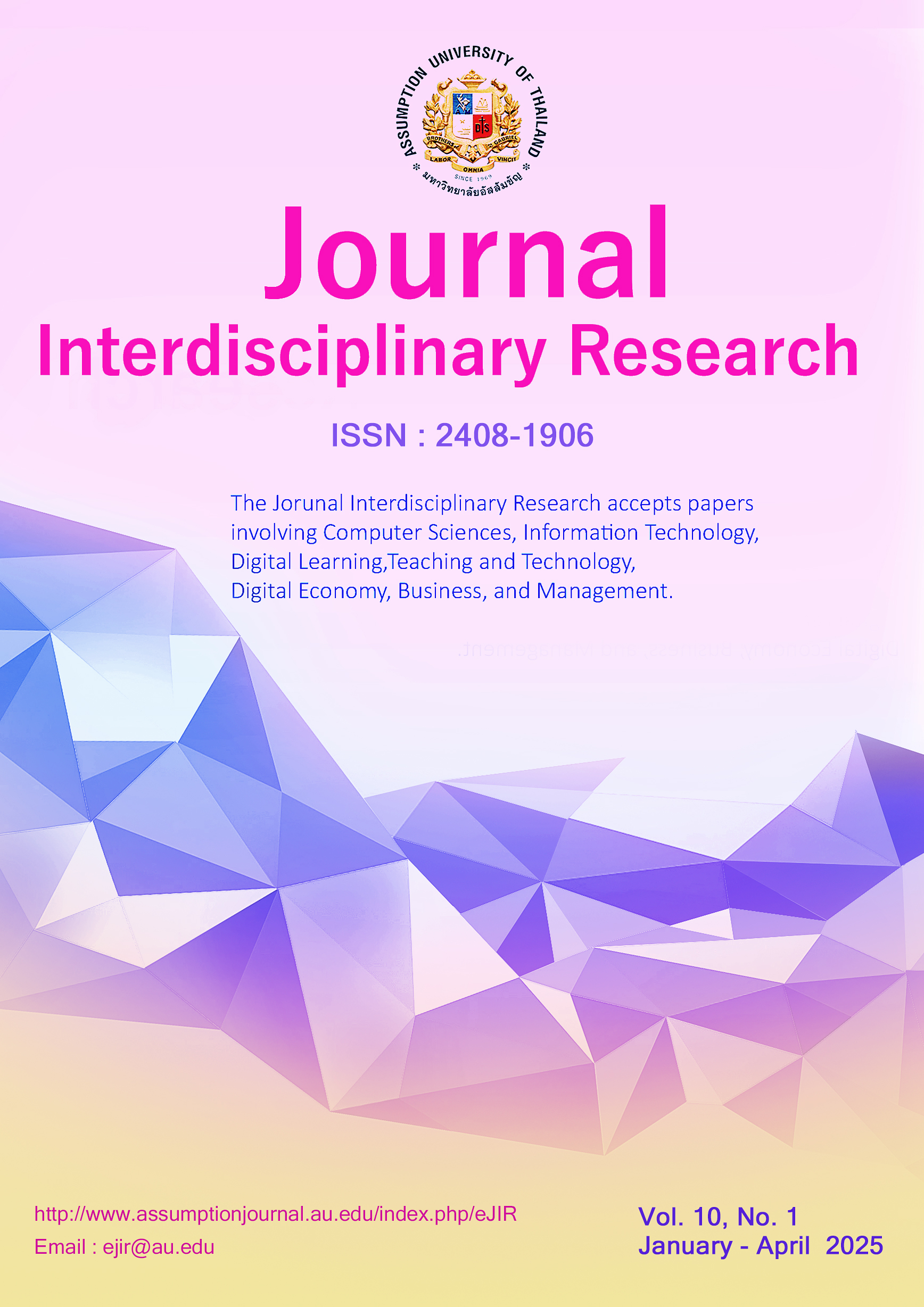Factors Impacting Teachers' Job Satisfaction in Chinese Foreign Language Universities: A Case Study of a Foreign Language University in Western China
DOI:
https://doi.org/10.14456/au-ejir.2025.7Keywords:
Job Satisfaction, Collaboration, Disciplinary Climate, Work Goals, Working ConditionsAbstract
Purpose: The study examines the influence of five independent variables—teacher collaboration, disciplinary climate, work goals, working conditions, and stakeholder participation—on a single dependent variable, teacher job satisfaction. Furthermore, the study seeks to determine whether significant differences exist among these variables. Research design, data and methodology: A validity assessment using the Index of Item-Objective Congruence (IOC) and a reliability test with Cronbach’s Alpha (n=30) were conducted. Multiple linear regression analyzed 170 teacher responses from Sichuan International Studies University of Science and Technology. A 14-week Strategic Plan (SP) was implemented with 30 teachers, followed by a paired-sample t-test to compare job satisfaction levels. Results: Multiple linear regression confirmed significant effects of all independent variables on teacher job satisfaction. Furthermore, the results of the paired-sample t-test revealed a significant difference in teacher job satisfaction between the current situation and the expected situation. Conclusions: By identifying critical determinants and testing the effectiveness of strategic interventions, this research contributes to the broader discourse on teacher well-being and professional fulfillment. The implications of these findings extend beyond Sichuan International Studies University of Science and Technology, offering practical recommendations for policymakers and educational administrators aiming to enhance teacher job satisfaction in similar institutional and regional settings.
References
Bartle, P. (2007). Participatory management: Methods to increase staff input in organizational decision making. http://cec.vcn.bc.ca/cmp/modules/pm-pm.htm
Butler, R. (2012). Striving to connect: Extending an achievement goal approach to social goals. Journal of Educational Psychology, 104(3), 726-742. https://doi.org/10.1037/a0028613
Hackman, J. R., & Oldham, G. R. (1976). Motivation through the design of work: Test of a theory. Organizational Behavior and Human Performance, 16(2), 250-279. https://doi.org/10.1016/0030-5073(76)90016-7
Hair, J. F., Anderson, R. E., Tatham, R. L., & Black, W. C. (1995). Multivariate data analysis. Prentice-Hall.
Hoppock, R. (1935). Job satisfaction. Harper and Brothers.
Ingersoll, R. M. (2003). Who controls teachers’ work? Power and accountability in America’s schools. Harvard University Press.
Israel, G. D. (1992). Determining sample size. University of Florida Cooperative Extension Service, Institute of Food and Agriculture Sciences, EDIS.
Jeffrey, R., Smith, D., & Williams, C. (2023). Exploring collaboration and stakeholder participation in fostering teacher satisfaction. International Journal of Educational Research, 128. https://doi.org/10.1016/j.ijer.2023.104233
Kelchtermans, G. (2006). Teacher collaboration and collegiality as workplace conditions: A review. Teaching and Teacher Education, 22(7), 1207-1215. https://doi.org/10.1016/j.tate.2006.07.001
Liu, S., Keeley, J., & Benoliel, P. (2021). The impact of organizational culture and working conditions on teacher job satisfaction. Studies in Educational Evaluation, 71. https://doi.org/10.1016/j.stueduc.2021.101099
Liu, Y., Benoliel, P., & Zhang, Q. (2022). Educational reforms and disciplinary climate: Their influence on teacher satisfaction. Teaching and Teacher Education, 120. https://doi.org/10.1016/j.tate.2022.103885
Locke, E. A. (1976). The nature and causes of job satisfaction. In M. D. Dunnette (Ed.), Handbook of industrial and organizational psychology (pp. 1297-1349). Rand McNally.
Louis, K. S., & Wahlstrom, K. (2011). Principals as cultural leaders. Phi Delta Kappan, 92(5), 52-56.
https://doi.org/10.1177/003172171109200512
Ning, B., Van Damme, J., Gielen, S., & Xu, Q. (2015). The impact of classroom disciplinary climate of schools on student learning: A study of 15-year-old students in OECD countries. School Effectiveness and School Improvement, 26(4), 487-508. https://doi.org/10.1080/09243453.2014.969282
Nunnally, J. C., & Bernstein, I. H. (1994). The assessment of reliability (3rd ed.). McGraw-Hill.
OECD. (2019). Working conditions of teachers and school leaders in OECD countries: Teachers and school leaders as lifelong learners. OECD Publishing. https://doi.org/10.1787/9789264313654-en
Papaioannou, A. G., & Christodoulidis, T. (2007). A self-determination approach to understanding students’ motivation in physical education. British Journal of Educational Psychology, 77(2), 289-309. https://doi.org/10.1348/000709906X128496
Reyes, M. R., Brackett, M. A., Rivers, S. E., White, M., & Salovey, P. (2012). Classroom emotional climate, student engagement, and academic achievement. Journal of Educational Psychology, 104(3), 700-712.
https://doi.org/10.1037/a0027268
Saira, N. (2017). The impact of psychological and emotional factors on teachers' job satisfaction. Journal of Educational Research, 64(2), 134-147. https://doi.org/10.1080/00220671.2017.1289413
Salinas-Falquez, C., González, J. L., & Ugalde-López, M. (2022). The role of working conditions in teachers' job satisfaction: A comprehensive perspective. Teaching and Teacher Education, 139. https://doi.org/10.1016/j.tate.2022.103916
Skaalvik, E. M., & Skaalvik, S. (2010). Teacher self-efficacy and teacher burnout: A study of relations. Teaching and Teacher Education, 26(4), 1059-1069. https://doi.org/10.1016/j.tate.2009.11.001
Skaalvik, E. M., & Skaalvik, S. (2015). Job satisfaction, stress, and coping strategies in the teaching profession—What do teachers say?. International Education Studies, 8(3), 181-192. https://doi.org/10.5539/ies.v8n3p181
Tsai, C. Y. (2015). The effects of school discipline on students’ motivation and achievement. Educational Research International, 4(2), 75-90.
Vangrieken, K., Dochy, F., Raes, E., & Kyndt, E. (2015). Teacher collaboration: A systematic review. Educational Research Review, 15, 17-40. https://doi.org/10.1016/j.edurev.2015.04.002
Wang, M. T., & Degol, J. L. (2020). School climate: A review of the construct, measurement, and impact on student outcomes. Educational Psychology Review, 28(2), 315-352. https://doi.org/10.1007/s10648-015-9319-1
Zhou, Y., & Li, J. (2021). Administrative control and teacher autonomy in Chinese higher education: A paradoxical relationship. Higher Education Policy, 34(3), 425-445. https://doi.org/10.1057/s41307-020-00215-2
Downloads
Published
How to Cite
Issue
Section
License
Copyright (c) 2025 Chunxue Lu

This work is licensed under a Creative Commons Attribution 4.0 International License.
A separate Copyright Form will be sent to authors whose paper is accepted for publication.






